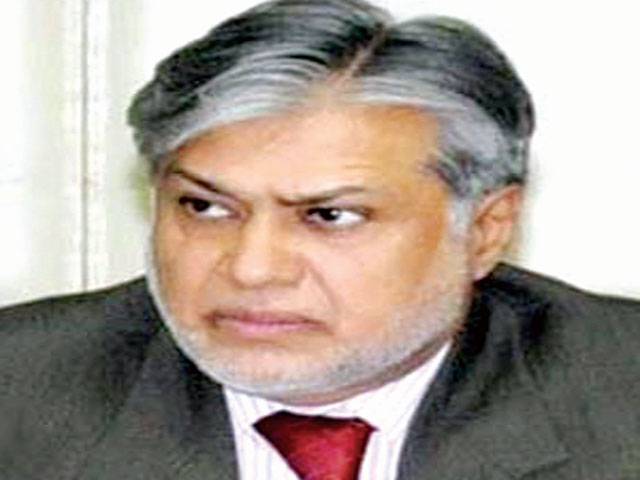ISLAMABAD - Finance Minister Senator Ishaq Dar has said that all major indicators of economy are pointing to the fact that economy has begun to show signs of revival and that it is moving on the right track, which was tattering when incumbent government took charge in June 2013.
He said that PML (N) brought in a strategy to rebuild the economy that had come to a standstill in previous five years. The economic indictors performed worse while long power outages had disrupted normal life completely and it had stifled economic growth in last five years.
The incumbent government has given focus on two important economic related issues, electricity and economy including stability of dwindling foreign reserves.
Finance Minister, in a report on economic situation of eight months, has claimed that financial indicators have performed well since Mohammad Nawaz Sharif was sworn in as the Prime Minister on 5th of June 2013. He said that Pakistan had no choice other than re-engaging ourselves with IMF for a new loan programme as country was forced to make huge repayment. The government approached the Fund to avert default on our loan obligations, and to gain international acceptance of our economic strategy. He said that incumbent government cleared the long lasting circular debt worth of Rs 500 billion, which added 1,700 megawatts of electricity in the system that resulted in reduced load shedding benefiting people and provision of electricity to business and industry.
Senator Ishaq Dar highlighted four measures taken by the government to improve the economic situation of the country. Firstly, he said that government had presented an austerity budget by cutting wasteful expenditure, reducing number of Ministries and abolishing discretionary grants of the Prime Minister and Ministers.
Allocation for poor and needy segment of the society increased to Rs 75 billion from Rs 40 billion. Secondly, he noted that government was to generate resources by increasing tax revenue, which could be used to invest in essential human and physical infrastructure - like building water dams to generate cheap electricity and enhance availability of water. The government aimed to increase the tax revenue from 8.5pc of GDP to 9.5pc of GDP in the current fiscal year, he added.
Thirdly, Finance Minister said government abolished the system of general subsidy on electricity in which the rich were provided with subsidy from the Government. Our revised subsidy policy only targets the poor and low-income segments of the society. Fourthly, to increase investments in the country the Prime Minister announced three incentive packages; 1) for the youth of Pakistan - the Prime Minister announced loan scheme, fee reimbursement scheme, laptop scheme, etc., 2) for businesses the Prime Minister announced incentives to increase their business footprint in the country - this is especially important as only lately, due to diplomatic efforts, Pakistan has been awarded duty-free imports by European countries through GSP+ status.
Talking about the economic indicators, Senator Ishaq Dar said GDP growth rate has recorded at 5pc in the first quarter (July-September) of the ongoing financial year 2013-14, compared to 2.9pc in the corresponding year last year. Similarly, large-scale manufacturing sector has posted a growth rate of 5.2pc during the period Jul-Nov 2013-14, which was 2.2pc for the same period last year. Two other developments further strengthen the view that the growth momentum is gradually picking up. First, the flow of credit to the private sector has increased manifold. From a meagre amount of Rs.53 billion in the first six months of 2012-13, credit to private sector increased to Rs 231 billion, much of it was for fixed investment. Second, there was an increase of 26pc in the imports of machinery. All this clearly indicates the rising economic activities that would in turn increase the growth rate.
He claimed that inflation has started declining from November and December while government is trying its best to control these pressures even further. Similarly, the government has controlled the budget deficit at 2.2pc during half (July-December) of the ongoing financial year against the IMF target of 3.5pc and 2.6pc actual recorded in the same period last year.
Senator Ishaq Dar said that exports were up by 3.2pc and remittances recorded a growth of 9.5pc in the first six months compared to the same period last year. Talking about the reserves, he said, “The difficult days, in which a Fund programme was managed without having had the support of significant upfront support, are behind us and in the days and months ahead we will see continuous build-up of reserves. A modest assessment suggests that at the close of March 2014 the reserves will be in the double-digit territory”.
The Finance Minister noted that sensing some exchange rate movement on the face of declining reserves and IMF programme, the speculators had started playing manipulative games that affected the exchange rate several times during the last 6 months. Effective measures were adopted to combat these efforts. The efforts included: a) Increased supplies of dollar notes in the market; b) Measures to ensure timely receipts of export earnings; c) Appropriate actions for containing imports of gold, including recent ban, to avert smuggling to neighbouring countries; and d) Tough signals of administrative and regulatory actions against the speculators. These measures have brought exchange rate stability and it is trading steadily around Rs.105/$-106/$ range without any significant speculative activity.
Thursday, April 18, 2024
Indicators show economic revival has begun: Dar

Caption: Indicators show economic revival has begun: Dar
ITP cracks down on traffic violations
April 18, 2024
Illegal housing societies in Rawalpindi to face crackdown
April 18, 2024
SZABIST traffic volunteers visit Safe City Islamabad
April 18, 2024
Hepatitis Challenge
April 18, 2024
IMF Predictions
April 18, 2024
Wheat War
April 18, 2024
Rail Revival
April 17, 2024
Addressing Climate Change
April 17, 2024
Justice denied
April 18, 2024
AI dilemmas unveiled
April 18, 2024
Tax tangle
April 18, 2024
Workforce inequality
April 17, 2024
New partnerships
April 17, 2024
ePaper - Nawaiwaqt
Advertisement
Nawaiwaqt Group | Copyright © 2024





